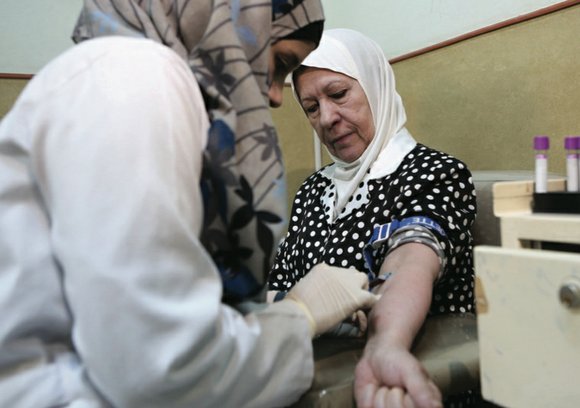Handling Ramadan and diabetes
Free Press wire reports | 6/26/2015, 11:52 p.m.

Muslims around the world marked the start of Ramadan last week. The month of intense prayer includes dawn until sunset fasting and nightly feasts.
Fasting is one of the five pillars of Islam, along with the Muslim declaration of faith, daily prayer, charity and making the hajj pilgrimage to Mecca.
To prepare for the fast, Muslims eat what is commonly called “suhoor,” a pre-dawn meal of power foods to get them through the day.
Muslims with Type 2 diabetes who fast during Ramadan may benefit from individualized education programs, according to findings presented earlier this month at the annual meeting of the American Diabetes Association in Boston.
Ramadan is the ninth month of the Muslim lunar calendar, when the Quran was first revealed to Muhammed, according to Islamic doctrine. The month was calculated to begin this year on June 18 in most countries.
While people with diabetes are exempt from fasting under Islamic law, many still choose to do so, said Dr. Mahmoud Ibrahim, an endocrinologist and the director of the Diabetes Education Center in McDonough, Ga.
“Our mission is not to ignore them but trying to help them achieve safer fasting as much as we can,” he said.
According to Dr. Ibrahim, fasting during Ramadan poses two types of risk to people with Type 2 diabetes, sometimes called adult-onset diabetes.
First are complications such as low blood sugar; high blood sugar; ketoacidosis, a metabolic imbalance that can be fatal; dehydration; and blood clots.
Second, Muslims who observe Ramadan often feast after breaking their fast, which can lead to weight gain.
“The decision to fast is actually an interplay between three major players — the person himself, his religious leader and the medical adviser,” Dr. Ibrahim said. “All people with Type 1 diabetes, or who need insulin, should not fast. Any underage child should not fast. And any women who are diabetic and pregnant should not fast at all.”
The ADA recommends that people with Type 2 diabetes who choose to fast during Ramadan receive education on how to achieve a safer fast. At the ADA meeting, Dr. Ibrahim presented the results of his study of 774 men and women with Type 2 diabetes who planned to fast last year during Ramadan. Study participants attended one of 16 clinics in Egypt, Iran, Jordan and Saudi Arabia. Half of the clinics provided an individualized education program to study participants while the other half provided usual care.
The education program addressed meal planning, physical activity, blood glucose monitoring and acute metabolic complications. It also provided an individualized diabetes treatment plan.
After Ramadan, Dr. Ibrahim and his team found that study participants who received individualized education were more likely to have modified their treatment during Ramadan, to monitor their blood sugar at least twice a day, and to have better knowledge of the signs and symptoms of hypoglycemia.
They also reduced their body mass index significantly and improved their blood glucose control. The education program group had more mild and moderate episodes of hypoglycemia, but fewer severe episodes.
Dr. Ibrahim stressed that he and his colleagues only enrolled people who were not on insulin in the study and did not have any complications of diabetes.
The full results of Dr. Ibrahim’s study have been published in the British Medical Journal.






